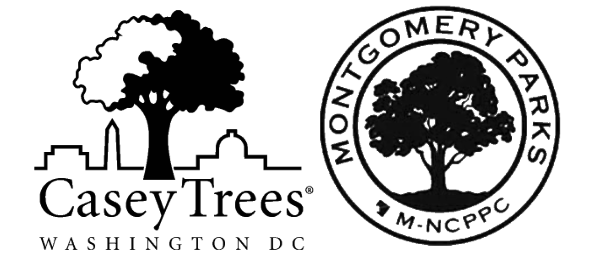Casey Trees and Montgomery Parks present the 13th annual Urban Tree Summit (UTS). The conference is held on September 18th, 2024, and takes place at the Silver Spring Civic Center. Conference presentations will focus on the health and welfare of trees in our increasingly developed landscapes. Learn from some of the country’s leading experts about innovative efforts to plant, protect, and preserve trees in urban and suburban settings.
We encourage all arborists, landscape industry and environmental/green industry professionals, engineers, designers, housing developers, and interested citizens to take advantage of this opportunity to learn from experts, experienced peers, and our local, tree-focused, and mission-driven organizations.
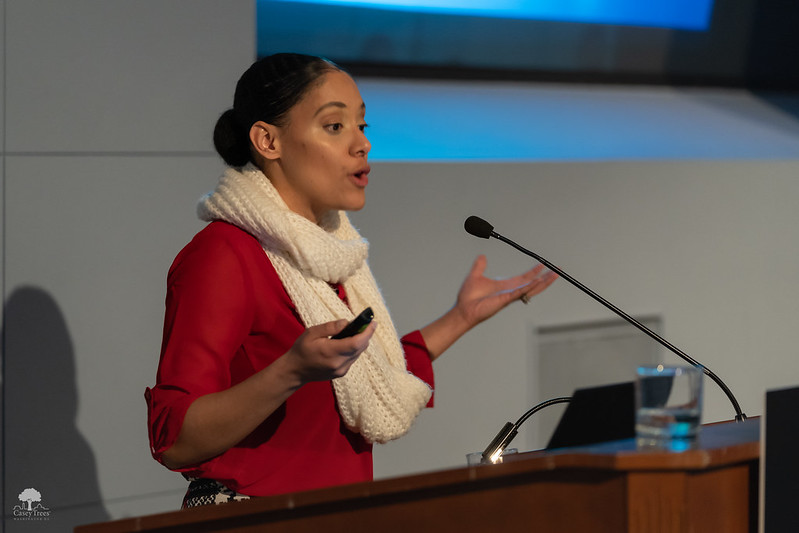
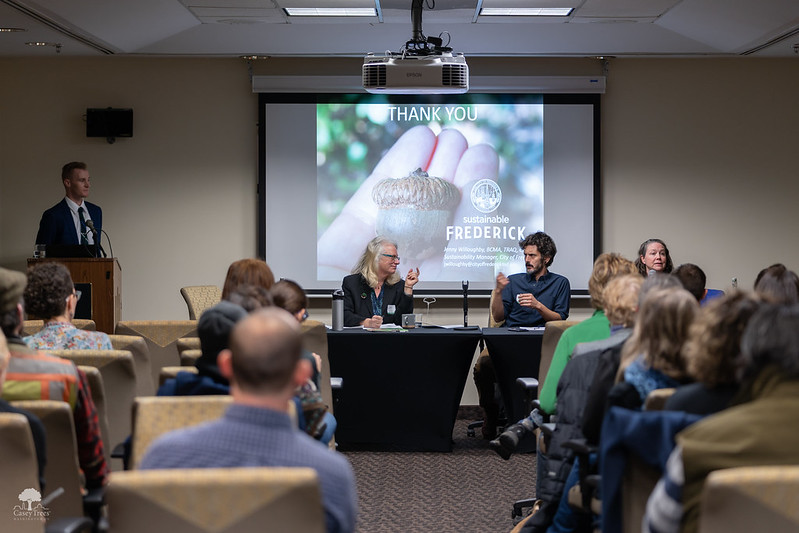
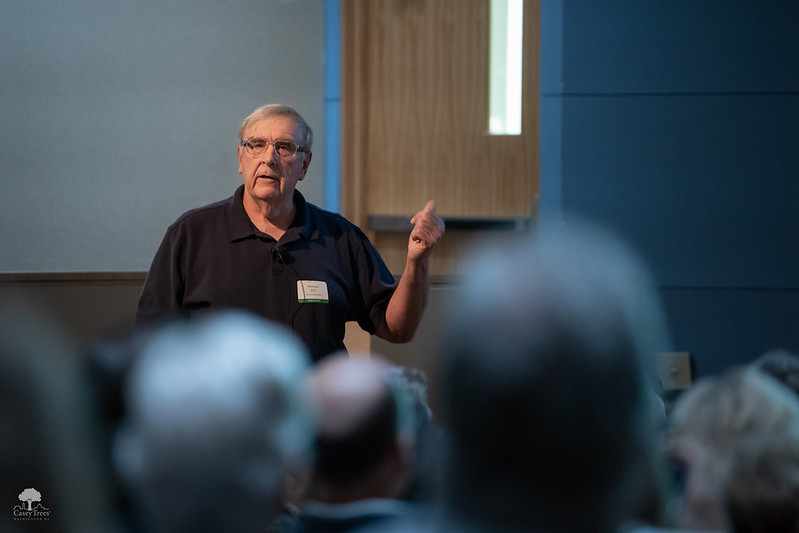
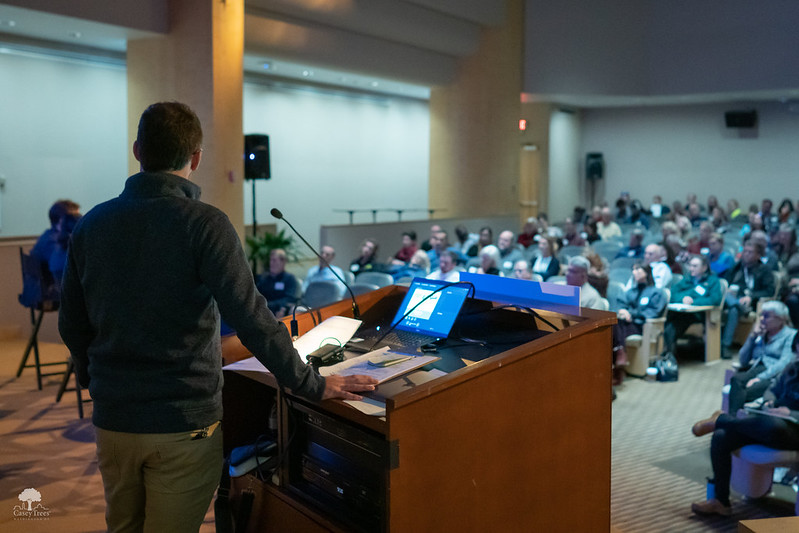
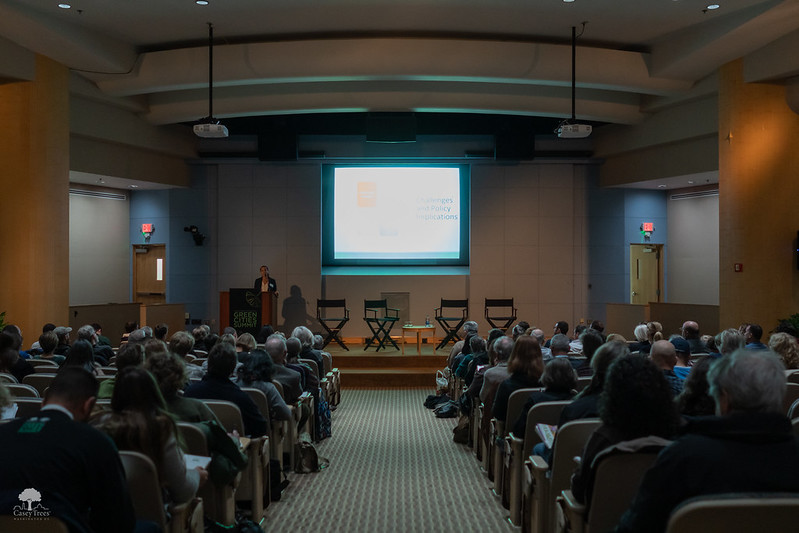
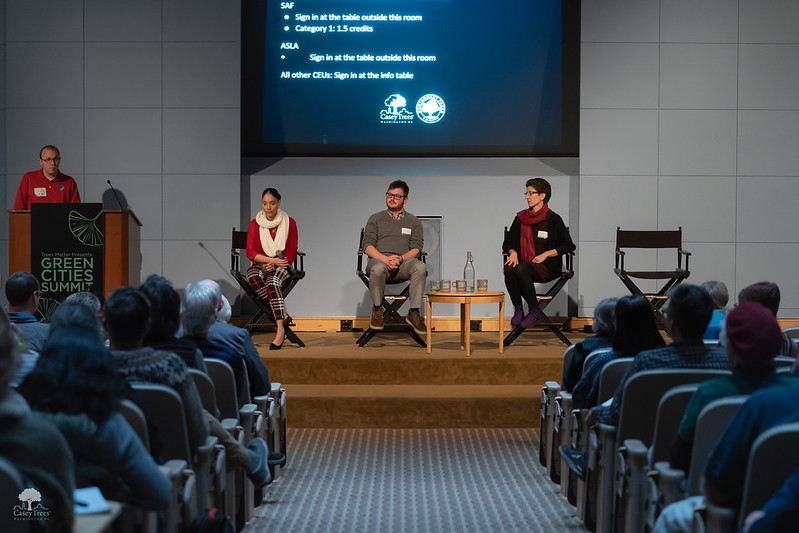
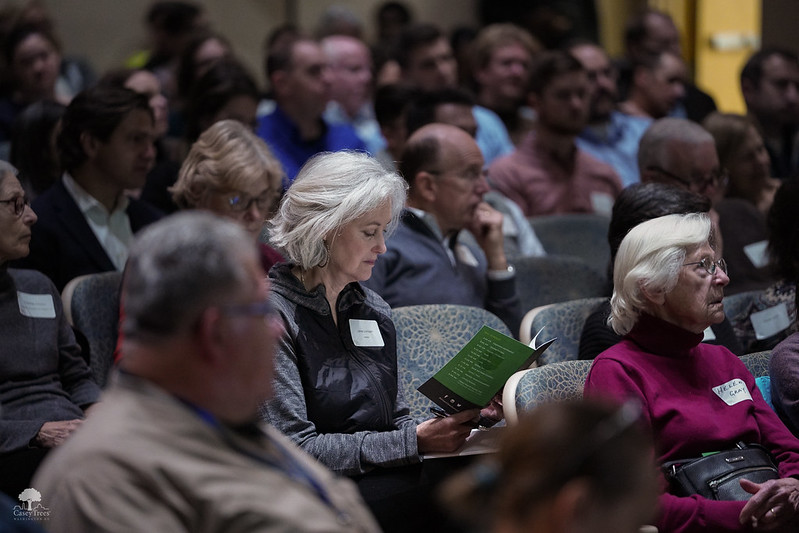
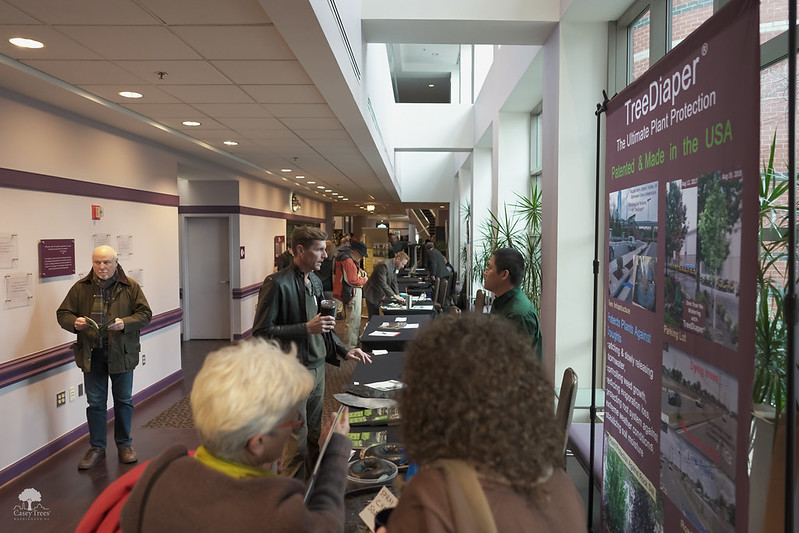
Sponsors
For those looking to connect with our audience of arborists, designers, advocates, urban planners, industry professionals, and engaged citizens - consider sponsorship. All sponsorship funds support this event. To see the full list of benefits, and secure your spot today, click the button below. Sponsorships will be accepted until August 30, 2024.
Tickets
Tickets are available for purchase at eventbrite.com for all sessions and the in-person conference. Identification will be checked at the door. Ticket rate is per person. All raised funds support this event.
Urban Tree Summit Agenda
Conference Speakers
Date: Wednesday, 9/18/24
Time: 9:00am - 3:00pm
Location: Prince George's County
Max Attendance: 300 attendees
Price: $99 ($89 early bird)
Lunch: Coffee/Tea service and snacks provided. Lunch not provided; several local restaurant options during the lunch break
CEUs Available: ISA, MDLTE, SAF, ASLA – exact numbers pending
Urban Foresters: Stories from the Front Lines
Leslie Berckes - Executive Director of the Urban and Community Forestry Society (UCFS)
Urban Forestry is a growing profession of people who make daily tree stewardship decisions. These are the front-line folks who make trees happen, the people without whom our collective tree goals will not be met! We need our urban foresters to feel confident and fully competent in their tree care decisions. However, it’s a tough job. Extreme weather, wearing too many hats, municipal politics…it can be a lot.
In this presentation, Executive Director of the Urban and Community Forestry Society (UCFS) Leslie Berckes will share some stories from UCFS Members who are creatively meeting these challenges and finding new opportunities.
UCFS is the professional membership home for urban foresters and gives voice to their concerns, challenges, and triumphs. Leslie will share case studies that reveal the novel solutions and innovative practices that UCFS members from across the country are putting into practice. What is the “urban forestry multiverse”? How can we best support the DMV’s urban forestry professionals through the current urban forestry inflection point?
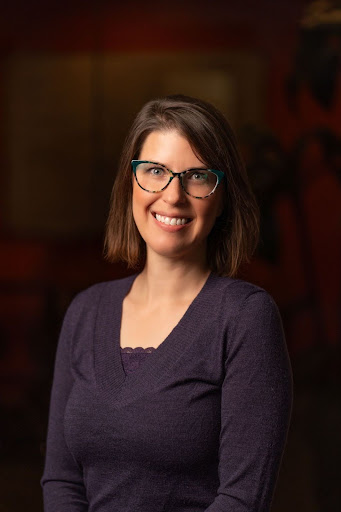
Leslie Berckes is the Executive Director of the Urban and Community Forestry Society (UCFS), the professional membership home for people who make daily tree planting and care decisions in communities across the world. She previously served as the Director of Programs for Trees Forever, a Midwest-based non-profit and has extensive urban forestry experience that includes volunteer management, planting and tree care logistics, and municipal tree contract management. Leslie is an ISA Certified Arborist and holds a master’s degree in Public Policy with an Environmental Policy emphasis from the University of Northern Iowa in addition to a bachelor’s degree in Marketing.
Fairfax County’s Tree Canopy: Examining the Effects of Land Development Regulations on Tree Canopy Conservation
Dr. Eric Wiseman - Associate Professor of Urban and Community Forestry, Virginia Tech
Brian Keightley - Director of Urban Forest Management Division, Fairfax County
Fairfax county is the most populous county in Virginia as well as the most populous locality in the Washington metropolitan area. Since 1980, Fairfax’s population has increased 89%, from about 600 thousand to about 1.1 million people. This population growth has brought considerable land development for housing, commerce, and transit. To minimize environmental impacts of urbanization and sustain quality of life for its residents, Fairfax County enacted a tree canopy conservation ordinance in 2009. This ordinance requires land developers to protect and replant trees in sufficient quantities to attain prescribed tree canopy cover levels within 10 years of development. A county-wide tree canopy assessment in 2021 afforded the opportunity to evaluate performance of the ordinance. Researchers at Virginia Tech have partnered with Fairfax County and Casey Trees to examine parcel-level tree canopy data for over 7,000 parcels developed between 2009 and 2011. In this presentation, Dr. Eric Wiseman (Virginia Tech) and Brian Keightley (Fairfax County) will share the key findings of the tree canopy study and discuss how Fairfax County is using conservation policies and practices to achieve its long-term tree canopy goals.
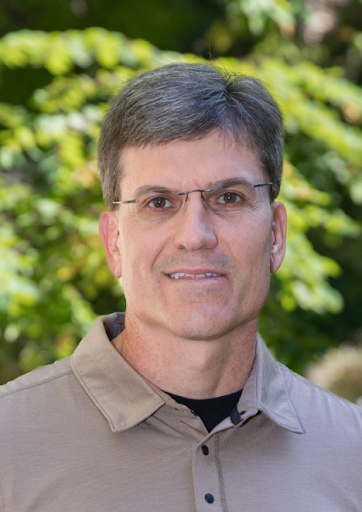
Eric Wiseman, PhD is an associate professor of urban and community forestry in the Department of Forest Resources and Environmental Conservation at Virginia Tech. He received B.S. and M.S. degrees from Virginia Tech and a Ph.D. from Clemson University. Dr. Wiseman worked as a field arborist for several years before branching out into research and academia. He has been an ISA Certified Arborist since 1998 and holds the ISA Tree Risk Assessment Qualification. His research focuses on improving our understanding of urban forest ecosystems and solving practical problems related to urban forest assessment, planning, and management. Dr. Wiseman’s outreach and extension efforts educate homeowners, municipalities, and green industry professionals in best practices of landscape tree care, urban forest conservation and management, and green infrastructure implementation. In his role as state coordinator for the Virginia Big Tree Program, he curates a register of over 500 champion trees. As an educator, Dr. Wiseman oversees an SAF accredited undergraduate curriculum in urban and community forestry as well as teaching several undergraduate and graduate courses. Dr. Wiseman has held numerous professional leadership positions, including serving on the executive committee of the Arboricultural Research and Education Academy, the accreditation committee of the Tree Care Industry Association, the board of directors of the Virginia Urban Forest Council, and the board of directors of the Mid-Atlantic Chapter of the International Society of Arboriculture. Dr. Wiseman has won several awards for his research and teaching accomplishments, including the ISA Early-Career Scientist Award, the Alex L. Shigo Award for Excellence in Arboricultural Education, the Outstanding Faculty Award of the Virginia Tech Department of Forest Resources and Environmental Conservation, the Certificate of Teaching Excellence for the Virginia Tech College of Natural Resources and Environment, and the Award for Outreach Excellence for the Virginia Tech College of Natural Resources and Environment.
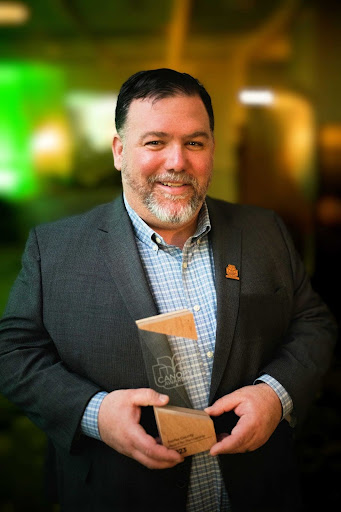
Brian Keightley is the Director of Fairfax County’s Urban Forest Management Division. In this role, he oversees not only the planting of trees throughout the county but also monitors and addresses pest threats to the urban forest and overall tree health. Previously responsible for administering the County’s tree conservation ordinances until 2023, the division now serves as technical advisors for the implementation of tree-related codes and climate resilience policies. Fairfax County is proud to hold a Tree City USA award, a distinction given by the Arbor Day Foundation to recognize excellence in tree planting, tree protection, and funding for green infrastructure – an award the county has received 39 consecutive years, culminating in its 40th anniversary in 2023. Under Brian’s leadership, the division has actively engaged in outreach efforts, emphasizing the importance of urban forest conservation and enhancement. This has been achieved through robust partnerships with the public, industry professionals, other county agencies, local schools, and nonprofit organizations. Brian holds both a B.S. in Forestry and a Masters of Natural Resources from Virginia Tech.
Selection in the City: A Nursery Supply Chain Analysis Explores Domestic Selection of Baltimore’s Trees
Nancy Falxa Sonti, PhD - Research Ecologist - Northern Research Station at USDA Forest Service
Cities across the world are pursuing ambitious tree planting initiatives in order to enhance provision of critical ecosystem services. To maintain desirable traits, planted trees are typically clones and/or cultivars chosen by local nurseries, and have limited genetic diversity among them. Many trees sourced from local nurseries have undergone artificial selection, which is the selection of traits that are desired by the breeder. In addition, urban trees also pass through successive selective filters of preference by the nursery industry selecting which trees to propagate and by urban foresters, landscape architects, contractors, and landowners selecting which trees to plant, in a process of “domestic selection.” In order to characterize domestic selection in the Baltimore, MD, USA metropolitan area, we examined the processes of selecting and disseminating trees from the horticultural industry to urban tree planting organizations and private development projects. We employed a semi-structured interview protocol with each actor in the supply chain network in order to determine the key factors that affect their decisions and behaviors at each stage in the supply chain. Interview questions included: factors affecting their decisions about which tree species or cultivars to grow, select, or plant; concerns about species and/or genetic diversity; concerns about climate and/or pest resilience; their knowledge about the source and methods of propagation for the trees they work with; and key trends in their industry over time.
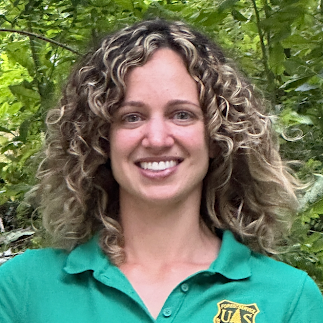
Nancy Sonti is a Research Ecologist with the US Forest Service Northern Research Station. She is based at the Baltimore Field Station, where she works as an interdisciplinary researcher studying urban social-ecological systems. Nancy works to build collaboration between academics, community groups, and government agencies through the Baltimore Urban Waters Federal Partnership, the Baltimore Ecosystem Study, the Northeast Urban Silviculture Network, the Chesapeake Bay Forestry Workgroup, Forests in Cities, and other networks from local to national scales. Her research interests include urban tree physiology across different site types from forested natural areas to street tree pits; processes of forest restoration and regeneration in urban areas; historical trajectories of urban forests; urban forest inventory and analysis (Urban FIA); and motivations for community engagement with urban green spaces. Nancy has a Bachelors Degree in History and Biology from Stanford University, a Masters in Conservation Biology from Columbia University, and a PhD in Plant Science from the University of Maryland, College Park.
Lorem ipsum dolor sit amet, consectetur
Asia Dowtin - Assistant Professor of Urban Forestry, Department of Forestry, Michigan State University
"Lorem ipsum dolor sit amet, consectetur adipiscing elit, sed do eiusmod tempor incididunt ut labore et dolore magna aliqua. Ut enim ad minim veniam, quis nostrud exercitation ullamco laboris nisi ut aliquip ex ea commodo consequat. Duis aute irure dolor in reprehenderit in voluptate velit esse cillum dolore eu fugiat nulla pariatur. Excepteur sint occaecat cupidatat non proident, sunt in culpa qui officia deserunt mollit anim id est laborum."

"Lorem ipsum dolor amet, consectetur adipiscing elit, sed do eiusmod tempor incididunt ut labore et dolore magna aliqua. Ut enim ad minim veniam, quis nostrud exercitation ullamco laboris nisi ut aliquip ex ea commodo consequat. Duis aute irure dolor in reprehenderit in voluptate velit esse cillum dolore eu fugiat nulla pariatur. Excepteur sint occaecat cupidatat non proident, sunt in culpa qui officia deserunt mollit anim id est laborum."
Growing Resilient Trees and Urban Forests Through Standards of Care
Richard Hauer - Director of Urban Forestry at Eocene Environmental Group and Professor Emeritus of Urban Forestry at the University of Wisconsin – Stevens Point
Growing trees to become centurions can occur by happenstance, but planning and putting tree care standards into practice increases the odds of success. Standards of Practice such as with the ANSI A300 Tree Care Standards provide a process to write a specification, which we will explore through two common practices such as tree planting and tree pruning. To start, Should you or Shall you do something? Terms have meanings and Standards with actions lead to positive tree outcomes. Shall suggests something you must do. While Should suggests a recommendation that while not mandatory is really something you should have a good reason to explain why you did not take action. This talk will delve into standards of care with trees and their importance to promote resilient urban forests.
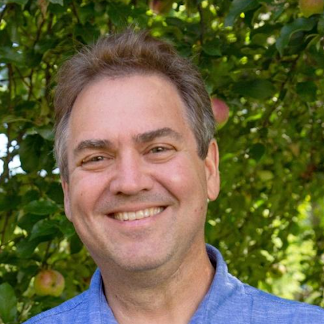
Richard Hauer is the Director of Urban Forestry at Eocene Environmental Group. He is a Professor Emeritus of Urban Forestry at the University of Wisconsin – Stevens Point. He received his B.S. from the University of Wisconsin – Stevens Point, M.S. from the University of Illinois, and Ph.D. from the University of Minnesota. Rich has conducted research in tree biology, urban forest management, emerald ash borer management, trees and construction, tree risk management, and ice storms. He was honored as the 2018 L.C. Chadwick Award for Arboricultural Research and 2023 Alex L. Shigo Award for Excellence in Education. He has over 200 publications and presented over 500 talks throughout the world. Dr. Hauer is also an Associate Editor of the Journal Urban Forestry & Urban Greenspaces.
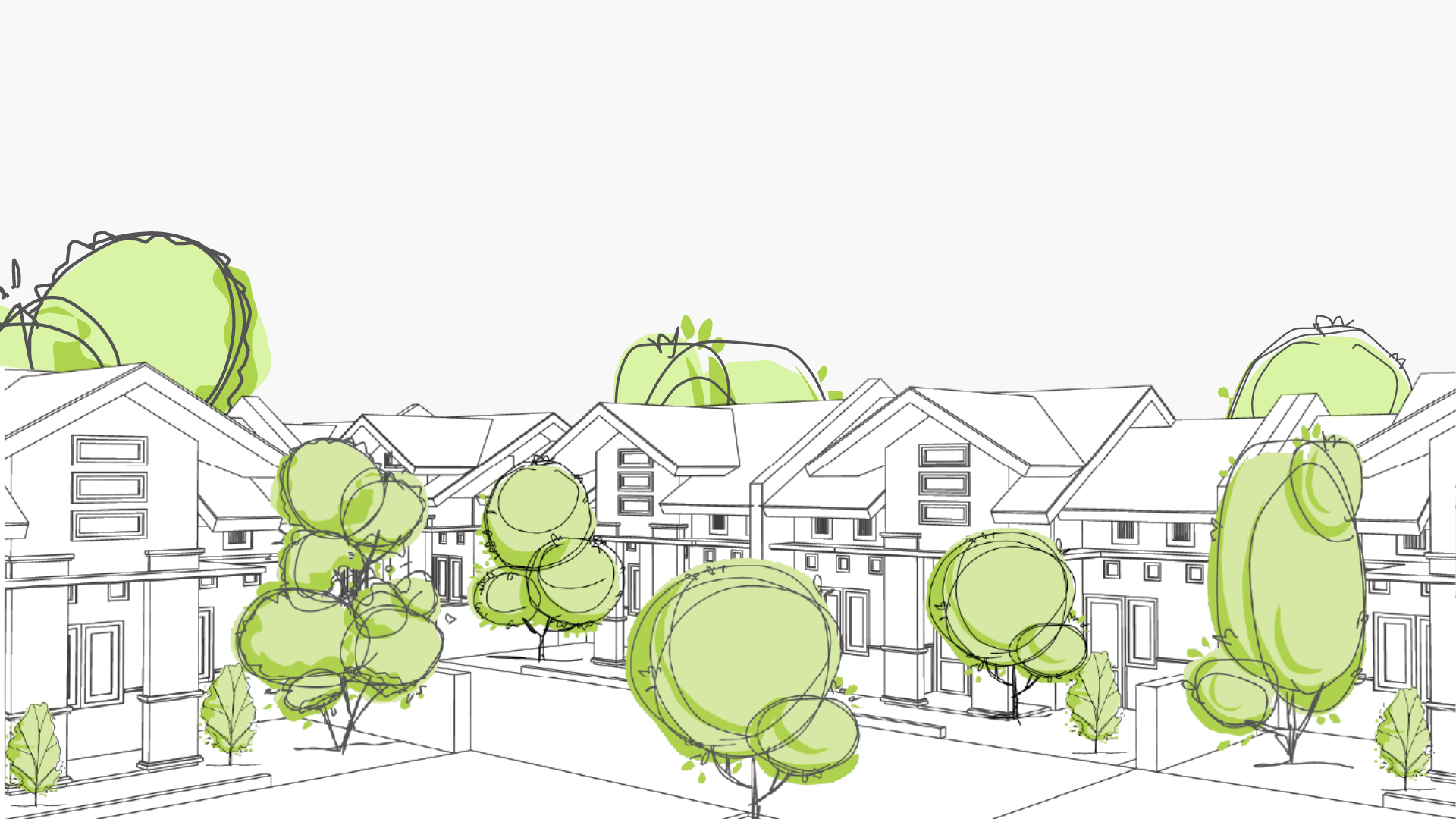
Field Sessions
Assisted Natural Regeneration at Langdon Park: How One Community is Helping its Forest Grow the Next Generation of Trees
Langdon Park Forest Stewards: Mary Pat Rowan, Allison Clausen, Delores Bushong
Date: Thursday, 9/19/24
Time: 9:00am - 12:00pm
Location: Langdon Park - 2901 20th St NE, Washington, DC 20018
Max Attendance: 30 attendees
Price: $50
Lunch: Yes
CEUs Available: ISA, MDLTE, SAF, ASLA - exact credit numbers pending.
Listening and Learning from the Forest – New trees are not growing in many city forests. Planting in natural areas that already have an existing forest is expensive, carries environmental costs, and poses ecological risks. Yet, we need to close canopy gaps in existing urban forests and have young trees grow to replace those that die. Assisted Natural Regeneration (ANR) is an alternative approach to planting trees that addresses the factors preventing regeneration so a forest can regrow. Join the Langdon Park Forest Stewards for this on-site visit to Langdon Park Forest Patch in northeast DC to see this method in action. After 4 years of ANR, there are over 2,000 tagged native tree seedlings representing 18 species.
Prince George’s County Champion Tree Bus Tour
Chris Garrett, Senior Park Ranger, Natural and Historical Resources Division, The Maryland National Capital Park and Planning Commission
Date: Friday, 9/20/24 (rain date - 9/27/24)
Time: 9:00am - 3:00pm
Location: Prince George's County
Max Attendance: 25 attendees
Price: $50
Lunch: Yes
CEUs Available: ISA, MDLTE, SAF, ASLA - exact credit numbers pending.
Join Chris Garrett for an exciting tour of Prince George's County Champion trees. Chris has been a Park Ranger for 24 years and is a tree and forest lover and the self proclaimed "Prince George's County Champion Tree Finder." The tour will feature a selection of impressive champion trees, including some of the largest trees, on record, in the Upper Marlboro area. Participants will travel by van from location to location to view these champion trees. Lunch will be provided.
Introduction to Forest Bathing at Brookside Gardens
Ana Leilani Ka’ahanui, Co-Founder of Capital Nature, Naturalist, and Certified Forest Therapy Guide
Date: Thursday, 9/26/24 (rain date 10/3/24)
Time: 9:30am - 12:00pm
Location: Brookside Gardens - 1800 Glenallan Ave, Wheaton, MD 20902
Max Attendance: 20 attendees
Price: $50
Lunch: Tea
CEUs Available: ISA, MDLTE, SAF, ASLA - exact credit numbers pending.
Join naturalist and Certified Forest Therapy Guide, Ana Ka’ahanui from Capital Nature, for an introduction to forest bathing. “Shinrin-yoku,” or taking in the forest atmosphere with all of your senses, is a way to slow down, unwind and connect to the natural world. Through a series of simple sensory exercises we’ll be experiencing the wonders of nature with this relaxing mindfulness practice. This Washington Post article will give you a glimpse of a typical forest bathing walk with Ana: Cleansing the soul and restoring the spirit with a spot of forest bathing.
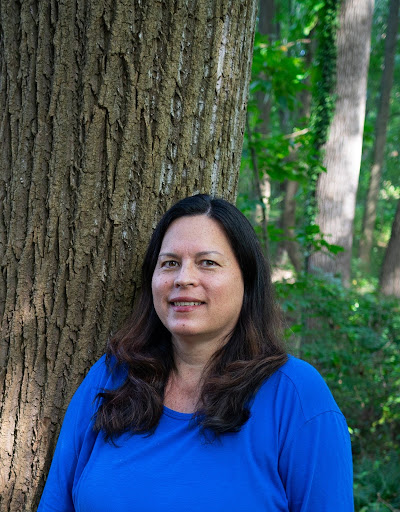
Ana Leilani Ka’ahanui is Co-Founder of the DC metro area nonprofit Capital Nature. Her organization’s mission is to connect the people and visitors of the DC area to the abundance of nature in the region. She has been a forest bathing guide since 2020 through the Association of Nature and Forest Therapy Guides and Programs and is devoted to sharing this nature-based mindfulness practice throughout the DC region. Her love for trees, as a dendrophile, extends to sharing her knowledge and experiences as a Virginia Master Naturalist. This includes leading tree identification and nature observation walks. Engaging in citizen science initiatives such as the global City Nature Challenge allows her to contribute to a broader understanding of her community’s biodiversity. Ana is also an experienced tour leader for biophilic and sustainability-based projects. She has worked at the U.S. Green Building Council since 2003 in various capacities that connect people to the green world. Ana is passionate about using the natural and built environment as a tool for learning and healing.
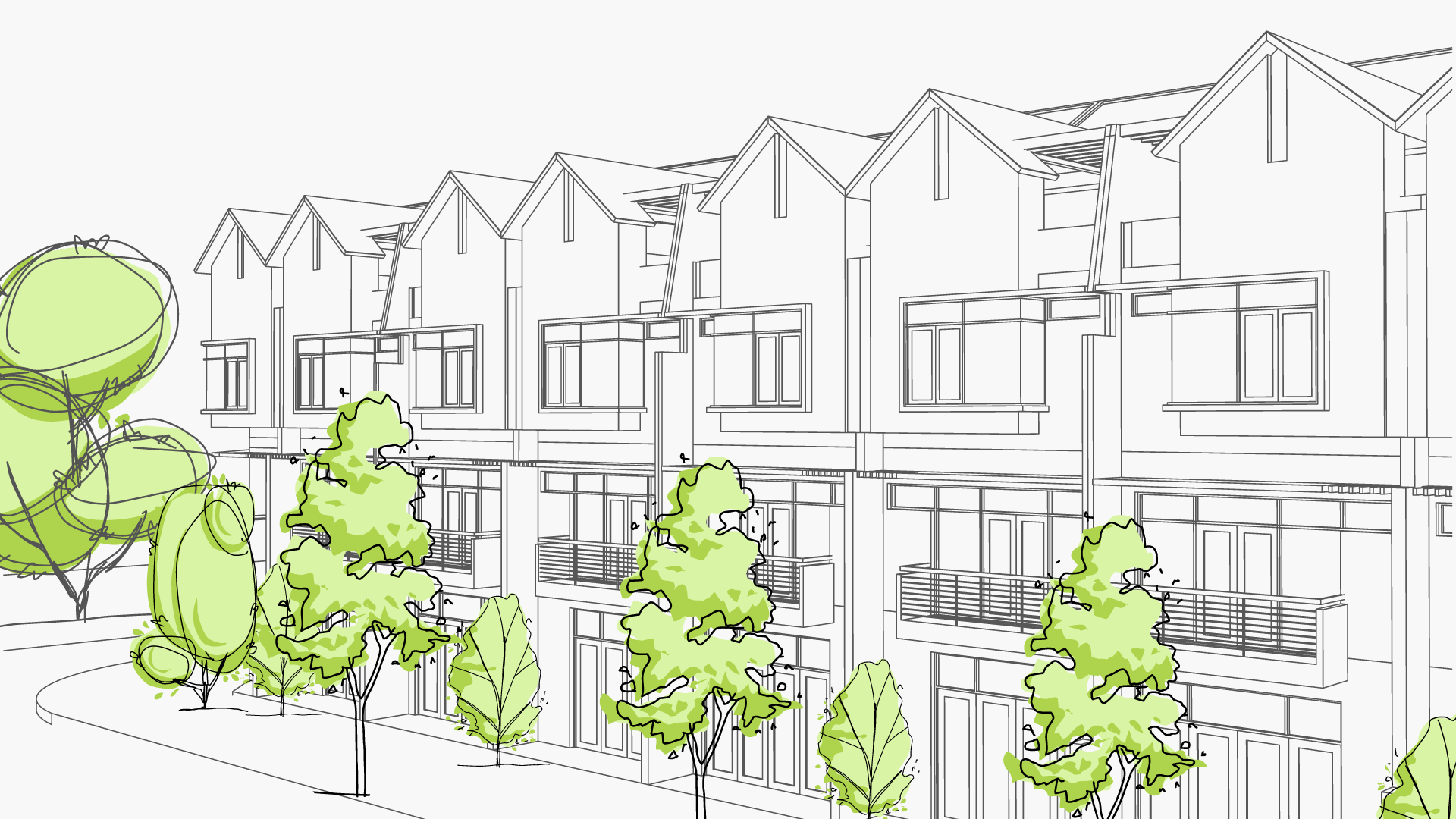
Event Details
This year we will be returning to an in-person, full-day conference on Wednesday, September 18th at the Silver Spring Civic Center. Learn from our outstanding line up of five industry leading experts on their research and contributions to the field of urban forestry. Plus, meet with other industry leaders and organizations, and network with other urban forestry professionals throughout the day.
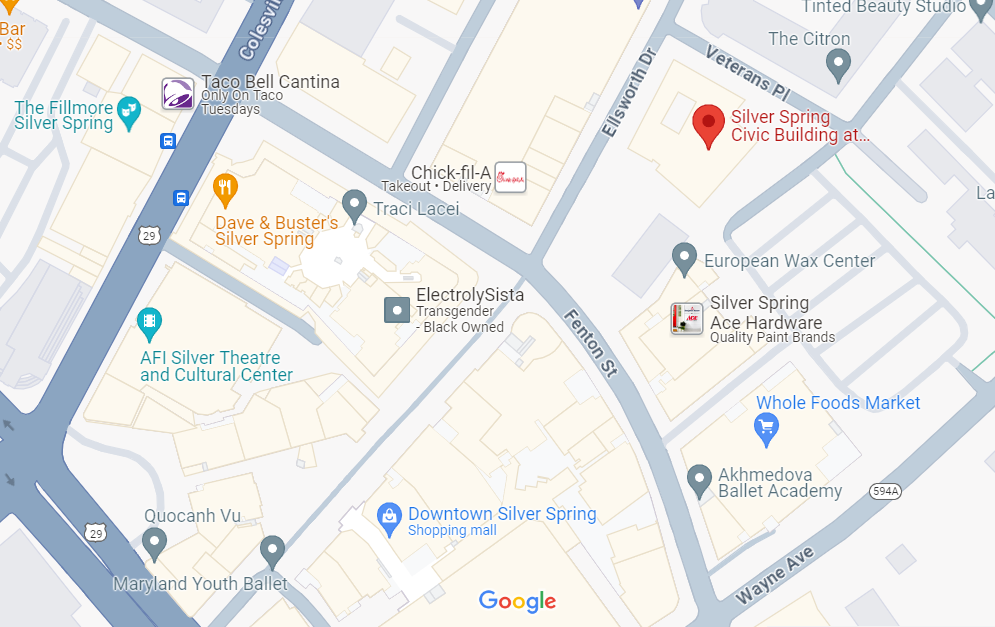
The Silver Spring Civic Center is located at 1 Veterans Pl, Silver Spring, MD 20910. Parking is available at nearby garages. Public Transportation is readily available to this location. The Silver Spring Metro Station is located about a 10-minute walk from the Civic Center, and ther are ample bus routes near the Civic Center.
In the days following the conference, join us for our exciting line-up of field sessions. Take a tree tour of the renowned Smithsonian gardens, learn about local reforestation efforts in Langdon Park, embrace the healing power of nature at a forest bathing session, or enjoy a bus tour around Prince George's County to view historic champion trees.
Continuing Education Credits (CEUs)
Continuing Education Units (CEUs) will be awarded by the International Society of Arboriculture (ISA), American Society of Landscape Architects (ASLA), MD Licensed Tree Expert (MD LTE), and Society of American Foresters (SAF).
The exact number of CEUs available for each session will be listed in the agenda below soon. CEUs will be available for each of the field sessions and the in person conference.
